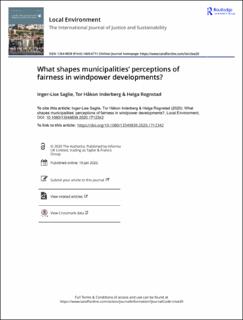What shapes municipalities’ perceptions of fairness in windpower developments?
Peer reviewed, Journal article
Published version

Permanent lenke
https://hdl.handle.net/11250/2673605Utgivelsesdato
2020Metadata
Vis full innførselSamlinger
Originalversjon
10.1080/13549839.2020.1712342Sammendrag
Siting controversies have become familiar in windpower development. Process and outcome fairness in the form of economic benefits to local communities and inclusion in decision-making processes are recognised as important elements in local acceptance of windpower installations. To these, we add the concept of “relative fairness” influencing perceptions of overall fairness. In this article, we examine why Norwegian municipalities agree to host windpower, and the role of process, outcome and relative fairness in this decision. Municipalities are central in providing welfare services, and in ensuring a viable local economy and local workplaces. Process fairness is important, as is evident when municipalities have little influence in the detailed planning of the plants. Also, outcome fairness, in the form of economic compensation – particularly through property tax – is decisive for positive attitudes towards windfarms, as municipalities can strengthen their role as welfare providers and boost local economic activities. Less emphasised are the effects on global climate and national climate goals. However, effects on local landscape and nature are also important for municipalities, as became clear when the national government proposed withdrawing the municipalities’ possibilities of levying property taxes. The municipalities argue that it is only fair to receive something in return for hosting windmills, and relative fairness is important to their argument for equal treatment regarding hydro- and wind-power electricity production in the form of a natural resource tax.